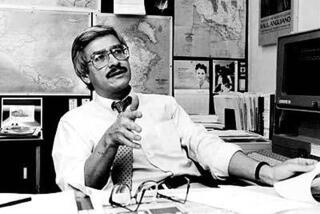Benny of the old school brought students a taste of culture and a love of learning
- Share via
It was in the Letters column of our Book Review section:
Benshimol of Belmont
For an authorized biography of the late Alfred Benshimol, principal of Belmont High School, I would appreciate any letters, memories, pictures or anecdotes pertaining to his tenure as a figure in L.A. high school education.
BERT S. GERARD, Ed.D.
P.O. Box 10774
Phoenix, Ariz. 85064
We sometimes called him Benny.
He was principal of Belmont High School in 1934, when I graduated, and he remained there, I believe, until 1947.
He was of the old school. I mean the old school. He was of the school of Emerson, Adams and Holmes--all dignity and learning.
He was an implausible figure for Belmont, which was an inner-city school, exactly one mile from the City Hall, and a melting pot of races and social backgrounds.
I don’t know whether it’s true, but the rumor was that Mr. Benshimol was a Harvard man. If so, that was one of his many mysteries--how a Harvard man, with all the credentials and pretensions that implied, had ended up as principal of a tough downtown school in the heart of the cultural wasteland--Los Angeles.
In any case, he met the challenge and busied himself in the rehabilitation of Belmont as Harvard West.
Whether Mr. Benshimol was physically in a room or not, his presence was felt throughout the school. He was not a tyrant; he was a disciplinarian. He believed it was his duty not only to turn out scholars, but also ladies and gentlemen.
In the current era it seems incredible, but it is a fact that Mr. Benshimol required all boys in his school to wear neckties , and that most of us did.
Of course he had a reason beyond a taste for autocratic power. We were caught in the Great Depression, and if we wore neckties and played the gentleman, he believed, our chances of finding jobs in the real world would be better.
Mr. Benshimol was not named Alfred Longfellow Benshimol for nothing. His scholarship was legend. He was known to quote Shakespeare to suit the moment, and during the noon hour he often took the stage of the auditorium to read aloud from the classics. He was a man of medium stature, but prepossessing in appearance, with a large head, high forehead and a prominent nose. He might have been a Shakespearean actor who had missed his calling.
I remember hearing that Belmont at that time had the highest scholarship standing and the highest delinquency rate in the California school system. I believe it.
We had excellent teachers, and under Mr. Benshimol, learning was the main goal. Achievement was encouraged. Mr. Benshimol was of the old school, but he was ahead of his time, as well. He knew the world of the Depression was especially cold for women, and he encouraged many girls to go on to college or to prepare themselves in some way to make it “out there.”
One of his most remarkable students was a girl named Manya (Minnie) Bornstein. Today, thanks in part to Mr. Benshimol’s influence, she is a successful lawyer--Manya Bertram.
Mrs. Bertram remembers how Benny helped her:
“I was taking an academic course but soon realized I would need more practical subjects. Mr. Benshimol took me under his wing and arranged for me to major in both areas. This was rarely permitted and meant many extra hours for me, but he insisted that I must somehow, some day, go to college. By the second semester of this double program, I was his personal secretary.”
When graduation time came Manya had qualified for a scholarship; but college was out of the question. She had to go to work.
“Benny was very upset and talked with me many hours to see if we couldn’t work it out, and then he extracted a promise from me that I would not give up on going to college.”
Benshimol got Manya a job with a downtown commercial house in which he had placed several of Belmont’s brighter boys. There was only one catch to this wonderful news.
“It seems that the employer wanted me to change my surname from Bornstein to ‘something easier for patrons and other employees.’
“At first I cried, and then I became angry. I said if I ever changed my name it would not be for anti-Semitic reasons, and I was insulted that a friend of mine would even think I would accept.
“The usually austere Mr. Benshimol became very sad and very tender. He calmed me down, told me he admired my principles and inquired whether I had ever wondered about his surname. ‘Ben Shimol,’ he said very slowly. ‘Son of Shimol from my forebears. I’m glad it was never changed. I know how you feel. . . .”
Mr. Benshimol then found a secretarial job for Manya with another company, and that led, many years later, when her children were off to college, to her going to law school.
“How many times I have wished there were some way I could let him know that I kept my promise to him, with results that exceeded either of our expectations.
“However underprivileged his students might be, he brought them a taste of culture and a love of learning and taught them to reach for the stars.”
Mr. Benshimol was in the finest tradition of public education.
And I’ll bet he never guessed that I’d become important enough some day that Manya Bertram would be handling my will.
More to Read
Sign up for our Book Club newsletter
Get the latest news, events and more from the Los Angeles Times Book Club, and help us get L.A. reading and talking.
You may occasionally receive promotional content from the Los Angeles Times.








